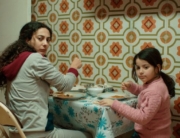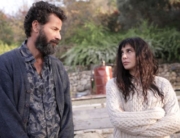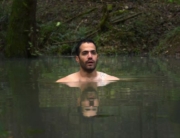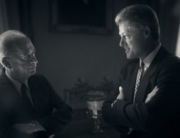
Former Speaker of the House Tip O’Neill hit it on the head: “All politics is local.” This fundamental principle plays out in director Haifaa Al Mansour’s fourth movie, in which a young, buttoned-down, by-the-book doctor throws her hat in the political ring because she wants a paved, and thus safer, road to her small-town clinic. Her previous pleas to her male supervisor met with abrupt resistance, and her candidacy is immediately dismissed because of her gender. In this scenario, the cowriter/director has created an underdog tale that also offers perhaps the most expansive look at contemporary Saudi Arabia in a feature film, or at least one with a U.S. distributor.
On her way to a medical conference in Dubai, Maryam (Mila Al Zahrani) is blocked from boarding her flight: her travel permit has expired, and a male guardian needs to renew it. But her musician father and widower, Abdulaziz (Khalid Abdulrahim), is on a tour around the country with his traditional folk band, and so he can’t be reached. (Although it’s still early in 2021, the movie instrument of the year may be the oud, of which Abdulaziz is a master player. The guitar-like instrument prominently features in Limbo too.)
One of the pleasures of the director’s efficient storytelling is the roundabout way developments occur. At first, Maryam signs up as municipal council candidate only as an expedient way to have face time with a distant relative—and city administrator—who might renew her travel permit. Almost accidentally, she begins to take her bid seriously when ambulances can’t reach her clinic via the flooded road. (In 2019, roughly around the time this movie was made, a royal degree removed the required permission for a woman to travel internationally.)
The novice politician’s sisters don’t think her running for office is such a smart idea. Selma (Dhay), a wedding photographer, thinks Maryam’s candidacy will be terrible for her business, and teenager Sara (Nora Al Awad) dreads what people will say online and behind the family’s back. And yes, at one point a heckler tells Maryam, “A woman’s place is in the home.” As a friend/work colleague jokingly puts it, her opposition is “every man in town.” Because of her surroundings, Maryam’s aims include not only improving the city infrastructure but challenging its mindset.
The filmmaker fills her frames with layers of details, whether its musicians in the background praying to Mecca or rambunctious female-only wedding parties, in which the guests let their hair down until they have to cover up once a groom enters the room. One stereotype regarding Saudi women is shattered in the opening moments: Maryam sits behind the steering wheel of her mud-splattered vehicle. Before 2018, Saudi women weren’t allowed to drive on their own.
In 2012, the director’s debut, Wadjda—reportedly the first ever feature completely shot in Saudi Arabia—premiered at the Venice Film Festival to a standing ovation. One of the most telling and insightful coming-of-age films of the last decade, it centers on an adolescent girl who challenges orthodoxy: all she wants is to own and ride a green bike, a no-go for girls. With its tempered outlook, Al Mansour’s latest film is more a wistful and pragmatic depiction of present-day Saudi society, also propelled by a headstrong heroine. Here, triumph comes in many forms.
















Leave A Comment